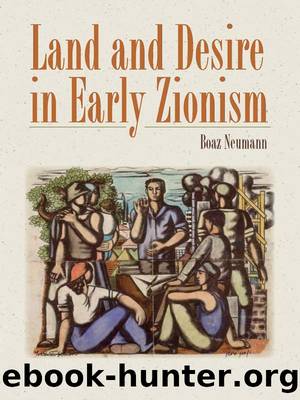Land and Desire in Early Zionism by Neumann Boaz;

Author:Neumann, Boaz;
Language: eng
Format: epub
Publisher: Brandeis University Press
The halutzim took pleasure in the new existential experience of the rebirth of their organs and the currents that coursed through their bodies. They exulted in the flow of their sweat. âWhen I walked behind Tanhum [Tanpilov?], hoeing the first cypress-lined avenue,â testified a member of Degania, âand the calluses on my hand burst and sweat blinded meâI was happy.â87 They reveled in the sense of their blood flowing. Golda Meyerson of Merhavia wrote that after a day of labor, a person is tired, exhausted. But it is a pleasant exhaustion: âYour body warms up, your blood flows through your veins like a brook, and you feel that you have created something in your day of work.â88 A woman at Degania was given her first opportunity to harvest a field with a scythe. âI felt my heart pounding within me,â she recounted, âand blood flowing.â89 The body's fatigue after a day's labor was likened by one halutz to âsparkling wine.â90
Labor disciplined the organs to work together naturally. Berl Katznelson meant precisely this when he spoke of âmanual skillââthe literal translation of his Hebrew idiom, tevunat kapayyim, is âwisdom of the hands.â91 He wrote to his sister trying to persuade her to accept any form of labor, to accustom herself to it, to know it. Labor, he said, was a precondition for the body's proper functioning. It was essential for the vitality of the body, soul, and organs. It ensured that one's eyes would not go blind, one's hands not grow clumsy, one's brain not doze, one's body not become âa lump of wax.â It was particularly essential in the Land of Israel, where one lived a life of labor on the soil, in a place where âspeech is [not] the most important thing, but rather heroism and capability, the capability of understanding a thing. âWisdom of the handsâ is what the ancient Hebrews called it.â92 In a later letter, Katznelson described his difficult journey as a laborer in the Land. For him labor required mobilizing body, spirit, consciousness, and soul: âNot only have my hands not worked as they should, but my brain has not grasped the work. My eye has not seen it and I have not understood what is around me. I lack âwisdom of the hands.ââ93
As the pioneersâ bodies were shaped through their organs, their senses awakened. As we saw, defective senses were characteristic of the exilic-body-without-organs, and the Land the halutzim encountered upon arrival also lacked organs. A land-without-organs cannot be perceived because there is nothing to perceive. As one pioneer noted, when it came to the Land's plant life, most of the new settlers âhad eyes that did not see.â94 In channeling their desire into the Land, the halutzim constituted themselves as bodies capable of perceiving the Land, while simultaneously creating the Land as an object of their senses. Yitzhak Pelah of Kiryat Anavim testified that in working outdoors and building the Land, the pioneer eye learned to see.95 Tzvi Nadav noted that, day by day, his eyes were learning to distinguish wheat from barley while the crops were still sprouting.
Download
This site does not store any files on its server. We only index and link to content provided by other sites. Please contact the content providers to delete copyright contents if any and email us, we'll remove relevant links or contents immediately.
| Bahrain | Egypt |
| Iran | Iraq |
| Israel & Palestine | Jordan |
| Kuwait | Lebanon |
| Oman | Qatar |
| Saudi Arabia | Syria |
| Turkey | United Arab Emirates |
| Yemen |
Empire of the Sikhs by Patwant Singh(22767)
The Wind in My Hair by Masih Alinejad(4843)
The Templars by Dan Jones(4558)
Rise and Kill First by Ronen Bergman(4545)
The Rape of Nanking by Iris Chang(4023)
12 Strong by Doug Stanton(3419)
Blood and Sand by Alex Von Tunzelmann(3056)
The History of Jihad: From Muhammad to ISIS by Spencer Robert(2506)
Babylon's Ark by Lawrence Anthony(2432)
The Turkish Psychedelic Explosion by Daniel Spicer(2245)
Gideon's Spies: The Secret History of the Mossad by Gordon Thomas(2235)
No Room for Small Dreams by Shimon Peres(2235)
Inside the Middle East by Avi Melamed(2230)
Arabs by Eugene Rogan(2193)
The First Muslim The Story of Muhammad by Lesley Hazleton(2154)
Bus on Jaffa Road by Mike Kelly(2035)
Come, Tell Me How You Live by Mallowan Agatha Christie(2027)
Kabul 1841-42: Battle Story by Edmund Yorke(1921)
1453 by Roger Crowley(1880)
